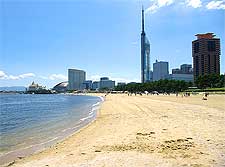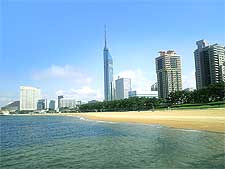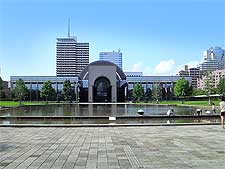Fukuoka History Facts and Timeline
(Fukuoka, Kyushu, Japan)

The capital city of the southern island of Kyushu, Fukuoka is believed to be Japan's oldest city due, with much of its ultimate wealth and success being aided by its relative proximity to Korea and China.
Some historians are of the opinion that the city was the first place in the whole of Japan that the Imperial Family set foot in, along with other travellers. However, as with many early origin theories in the country, the history of Fukuoka remains contested.
Mongol Invasions
The Mongol Empire, under the leadership of Kublai Khan, planned to take over the ruling of Japan in the 13th century. This was the first time that the country had faced external pressure. After proposals of Khan's rule were repeatedly turned down, Mongolia invaded the north of Kyushu in 1274. The first invasion was compromised by severe weather conditions and poor planning, while two further invasions were thwarted in the following seven years, ensuring that the area, and Japan as a whole, remained completely independent.

History of the Modern City
The modern city of today was formed in 1889, after both Fukuoka and neighbouring Hakata were amalgamated. Historically, Hakata functioned as the area's port, as well as its merchant neighbourhood. It has more association with culture and is still the area's main cultural district today. Fukuoka, on the other hand, was home to large numbers of samurai and now serves as the home to the city's principal shopping district.
When the two former cities made the big decision to merge, there was a meeting to choose the new city's name. The first choice was Hakata, but that was short-lived, as a group of samurai interrupted the proceedings and made those in authority reverse the decision, meaning that Fukuoka, although not intended, ultimately became the name of the city. However, Hakata remains a key part of Fukuoka's history and the name is still used for that area of the city, as well as being the name of the city's busy railway station.

20th Century
The 20th century saw Fukuoka develop into one of Japan's most important cities. The Fukuoka Medical College was founded in 1903, although it changed its name to the Kyushu Imperial University in 1911 and remains the island's biggest university to this day. The city's streetcar service started in 1910 and was in operation for many decades, until the end of the 1970s.
Fukuoka's history, like much of Japan, has strong connections to World War II. Although the city was bombed in 1945, it escaped the bombardment that many cities endured on the island of Honshu.
Following the war, Fukuoka Airport, now Japan's fourth-busiest, opened in 1951, while the subway opened in the year of 1981, just two years after the closure of the streetcar network. The city's commercial potential was noted in 1988 when the Nankai Hawks, Osaka's professional baseball team, relocated to Kyushu and became the Fukuoka Daiei Hawks (now the SoftBank Hawks).
 The capital city of the southern island of Kyushu, Fukuoka is believed to be Japan's oldest city due, with much of its ultimate wealth and success being aided by its relative proximity to Korea and China.
The capital city of the southern island of Kyushu, Fukuoka is believed to be Japan's oldest city due, with much of its ultimate wealth and success being aided by its relative proximity to Korea and China.
